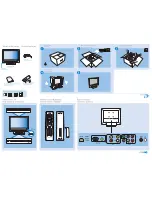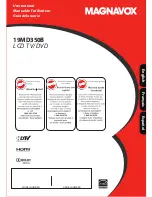
8
/55
Disposal
(used Electrical and Electronic Equipment)
Packing and electrical goods should be recycled appropriately, and
not treated as household waste. Please dispose of this equipment at
your applicable collection point for the recycling of electrical and
electronic equipment waste. By ensuring the correct disposal of this
product, you will help prevent potentially hazardous to the
environment and to human health, which could otherwise be caused
by unsuitable waste handling of this product. The recycling of materials will help conserve
natural resources. Please do not dispose of your old electrical and electronic equipment
with your household waste.
There may be penalties in your state or territory for dumping
these products, including outside collection sites and charity bins.
For more detailed information about recycling of this product, please contact your local
city office, your household waste disposal service or the shop where you purchased the
product.
National Television and Computer Recycling Scheme
The National Television and Computer Recycling Scheme was established in 2011 to
provide Australian householders and small business with access to industry-funded
collection and recycling services for televisions and computers. To date, more than 1,800
collection services have been made available to the public and more than 130,000 tons of
TV and computer e-waste has been collected and recycled under the scheme. This has
diverted hazardous materials away from landfill and enabled the reuse of valuable
resources contained in e-waste. The scheme has also created employment opportunities
within the recycling sector and assisted local government manages e-waste by providing
alternative collection services.
Englaon has joined this Scheme for years, and we are doing our best to protect both
environment and human health. We encourage our users to do the right things to help us
protect our environment and human health by recycling our products.
Ways to safely dispose of unwanted televisions:
•
Using recycling services such as those provided by local councils or other providers.
(a fee may apply)
•
Passing them on to friends or family.
•
Asking second-hand shops or a charity if they will take them if they are still in
working order.
•
Storing them out of the weather until they can be disposed of appropriately.










































